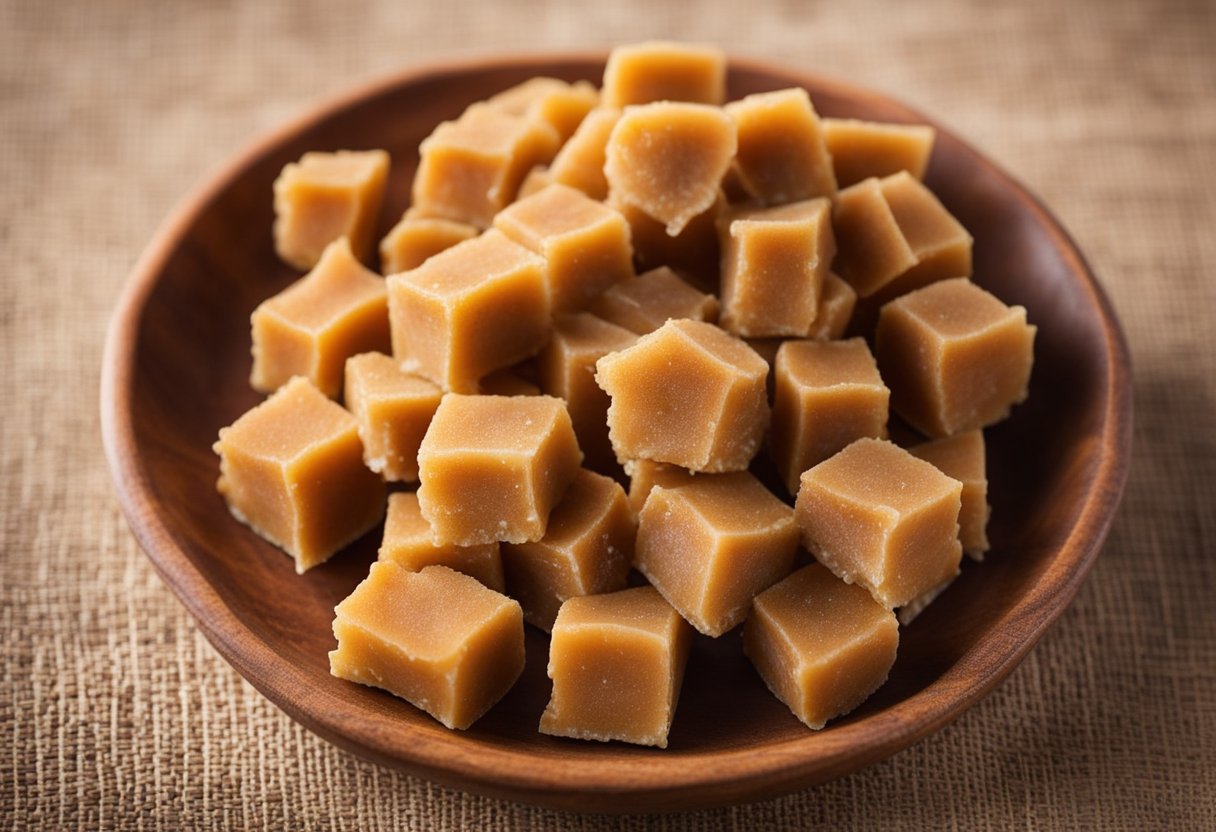As a dog owner, I’m always looking for new and healthy treats to give my furry friend. Recently, I’ve been wondering about jaggery and whether it’s safe for dogs to eat. Jaggery is a type of unrefined sugar made from sugarcane or palm sap, and it’s commonly used in Indian cuisine as a sweetener. But can dogs eat jaggery?

After doing some research, I’ve found that jaggery is not toxic to dogs in small amounts. However, it’s important to keep in mind that jaggery is high in calories and can lead to weight gain if given too frequently or in large quantities. Additionally, jaggery can increase the risk of intestinal parasites in dogs, so it’s best to avoid giving it to dogs with a history of digestive issues.
If you do decide to give your dog jaggery as an occasional treat, it’s important to monitor their behavior and health. Signs of an upset stomach or allergic reaction may include vomiting, diarrhea, or difficulty breathing. As with any new food, it’s best to introduce jaggery slowly and in small amounts to see how your dog reacts.
Can Dogs Eat Jaggery
https://www.youtube.com/watch?v=lNDBk4PoH34&embed=true
As a dog owner, I always wonder if I can share my favorite foods with my furry friend. Jaggery is a popular sweetener that is commonly used in many cuisines. But can dogs eat jaggery?
After researching and consulting with veterinarians, I have found that jaggery is not toxic to dogs. However, it is not recommended to feed your dog jaggery regularly.
Jaggery is high in sugar and can cause obesity, dental problems, and other health issues in dogs if consumed in excess. Moreover, jaggery is often made in unhygienic conditions, which can lead to bacterial infections in dogs.
If you want to give your dog a sweet treat, it is best to stick to dog-friendly fruits such as apples, bananas, and strawberries. These fruits are low in calories and provide essential nutrients to your furry friend.
In conclusion, while jaggery is not toxic to dogs, it is not recommended to feed it to your furry friend regularly due to its high sugar content and potential health risks. As a responsible dog owner, it is essential to provide a balanced and nutritious diet to your furry friend to ensure their overall well-being.
The Nutritional Value of Jaggery

As a dog owner, I always try to ensure that my furry friend eats a balanced and healthy diet. I have heard that jaggery is a natural sweetener and wondered if it could be a healthy addition to my dog’s diet. Here’s what I found out about the nutritional value of jaggery.
Jaggery is a traditional sweetener made from sugarcane juice or palm sap. It is unrefined and contains natural minerals and vitamins. Jaggery is a rich source of iron, calcium, and magnesium. It also contains antioxidants that help to prevent damage to cells and tissues.
One hundred grams of jaggery contains approximately 383 calories. It is high in carbohydrates and sugar, so it should be given to dogs in moderation. Too much sugar can cause weight gain and other health problems in dogs.
Jaggery is also a good source of vitamins. It contains vitamin B1, B2, B3, and B6. These vitamins are essential for maintaining a healthy nervous system, promoting healthy skin, and aiding in the digestion of food.
In addition to vitamins, jaggery is rich in minerals. It contains iron, which is essential for the production of red blood cells. Calcium and magnesium are also present in jaggery. These minerals are important for maintaining strong bones and teeth.
In conclusion, jaggery is a natural sweetener that contains essential vitamins and minerals. While it can be a healthy addition to a dog’s diet, it should be given in moderation due to its high sugar content. As always, it’s best to consult with a veterinarian before making any changes to your dog’s diet.
Potential Health Benefits

Jaggery is a natural sweetener that is derived from sugarcane or palm sap. It is a popular ingredient in many Indian dishes and is often used as a substitute for refined sugar. While jaggery is safe for dogs to eat in small amounts, it is important to understand its potential health benefits.
Boosting Immunity
Jaggery is rich in antioxidants, which can help boost your dog’s immune system. Antioxidants are known to fight against free radicals in the body, which can cause damage to cells and tissues. By consuming jaggery, your dog can benefit from the antioxidant properties that can help protect against diseases and infections.
Aiding Digestion
Jaggery is known to be beneficial for the digestive system. It can help stimulate the digestive enzymes in the stomach, which can aid in the breakdown of food. Additionally, jaggery can help prevent constipation by promoting bowel movement and cleansing the intestines. This can help improve your dog’s overall digestive health.
Weight Management
Jaggery is a healthier alternative to refined sugar and can be used as a sweetener in your dog’s diet. It contains fewer calories than sugar and is rich in essential vitamins and minerals. This can help your dog maintain a healthy weight and prevent weight gain.
Overall, jaggery can be a beneficial addition to your dog’s diet in moderation. However, it is important to note that excessive consumption of jaggery can lead to weight gain and other health issues. As with any new food, it is recommended to introduce jaggery gradually and monitor your dog’s reaction.
Possible Side Effects
As with any food, it is important to be aware of the potential side effects that can occur when dogs eat jaggery. While jaggery is generally considered safe for dogs to consume in moderation, it is important to monitor your pet for any adverse reactions.
Digestive Issues
One of the most common side effects of feeding jaggery to dogs is digestive issues. This can include vomiting, diarrhea, and an upset stomach. These symptoms can occur if your dog eats too much jaggery or if they have a sensitive stomach.
If you notice any of these symptoms, it is important to stop feeding your dog jaggery and monitor their condition. If the symptoms persist or worsen, it is recommended to consult with your veterinarian.
Allergic Reactions
While rare, some dogs may have an allergic reaction to jaggery. This can manifest as itching, hives, or swelling of the face, lips, or tongue. In severe cases, an allergic reaction can lead to difficulty breathing or anaphylaxis.
If you suspect that your dog is having an allergic reaction to jaggery, it is important to seek veterinary care immediately. Your veterinarian may recommend an antihistamine or other treatment to alleviate the symptoms.
In conclusion, while jaggery can be a tasty treat for dogs, it is important to be aware of the potential side effects that can occur. By monitoring your pet’s consumption and being aware of the symptoms of an adverse reaction, you can help ensure that your furry friend stays happy and healthy.
Alternatives to Jaggery in Dog’s Diet
As a pet owner, it’s important to provide wholesome daily meals to your furry friend. While occasional treats are a great way to explore new tastes and textures, it’s essential to maintain a balanced diet that meets their calorie quotas. Jaggery, a type of unrefined sugar, is not recommended for dogs as it can cause digestive issues and obesity. Here are some healthy alternatives to jaggery that you can incorporate into your dog’s diet.
Fruits and Vegetables
Fruits and vegetables are a great source of antioxidants, nutrients, and vitamins that can help keep your dog healthy. Some fruits that are safe for dogs to eat include apples, bananas, blueberries, cantaloupe, cranberries, cucumbers, mangos, oranges, pears, peaches, pineapple, pumpkin, raspberries, strawberries, and watermelon. When feeding your dog fruits and vegetables, make sure to remove any seeds, core, or skin that may be harmful to them.
Protein Sources
Protein is an essential component of a dog’s diet and can be found in various sources such as eggs, lean meats, and fish. Eggs are a great source of protein and can be cooked in different ways to provide some variety in your dog’s diet. Lean meats such as chicken, turkey, and beef are also great sources of protein but should be cooked thoroughly to avoid any bacterial infections. Fish such as salmon and tuna are also excellent sources of protein, but make sure to remove any bones before feeding them to your dog.
Healthy Treats
Treats are a great way to reward your dog for good behavior or as a snack between meals. However, it’s important to choose healthy treats that are low in calories and won’t harm your dog’s teeth. Some healthy treats that you can give your dog include pet treats made specifically for dogs, peanut butter, and honey. When choosing treats, make sure to read the labels and avoid any treats that contain xylitol, which is toxic to dogs.
In addition to providing a balanced diet, it’s also essential to keep your dog hydrated. You can do this by providing them with fresh water and foods that have a high density in hydration, such as cucumbers and watermelon. It’s also important to keep your dog’s teeth clean by brushing them regularly and providing them with toys that can help clean their teeth.
Overall, it’s important to remember that dogs are omnivores and can benefit from a variety of fruits, vegetables, and lean proteins in their diet. By incorporating these healthy alternatives to jaggery into your dog’s diet, you can help keep them healthy and happy.
Precautions When Feeding Jaggery
As a pet owner, it is essential to know what foods are safe for your dog to eat. Jaggery, a type of unrefined sugar, is a common ingredient in many Indian dishes and desserts. While jaggery is generally considered safe for humans, it is not recommended for dogs.
Jaggery contains high levels of sugar, which can cause weight gain and dental problems in dogs. Additionally, jaggery can cause digestive issues such as diarrhea and vomiting. Therefore, it is best to avoid feeding jaggery to your dog.
If you accidentally feed your dog jaggery, it is essential to monitor them for any signs of discomfort. If your dog experiences any adverse reactions, contact your veterinarian immediately.
As with any human food, it is important to practice caution when feeding your dog. Always consult with your veterinarian before introducing new foods to your dog’s diet. Additionally, consider investing in pet insurance to protect your dog in case of any unexpected medical emergencies.
In conclusion, while jaggery may be a tasty treat for humans, it is not recommended for dogs. As a responsible pet owner, it is important to prioritize your dog’s health and wellbeing by avoiding feeding them potentially harmful foods.
Conclusion
Based on my research, it appears that dogs can eat jaggery in moderation. Jaggery is a natural sweetener made from sugarcane juice. It is a healthier alternative to refined sugar as it contains essential vitamins and minerals like iron, potassium, and magnesium. However, it is important to note that jaggery is still high in calories and should only be given to dogs in small amounts.
While jaggery may have some health benefits, it is not a necessary part of a dog’s diet. Dogs require a balanced diet that includes protein, carbohydrates, fats, vitamins, and minerals. It is important to consult with a veterinarian before introducing any new food to your dog’s diet, including jaggery.
In addition, it is crucial to ensure that the jaggery you are giving to your dog is free from any harmful additives or preservatives. Some jaggery products may contain chemicals or artificial sweeteners that can be harmful to dogs.
Overall, while jaggery may be a healthy and natural sweetener for humans, it is important to exercise caution when giving it to dogs. Moderation and consultation with a veterinarian are key to ensuring your dog’s health and well-being.






